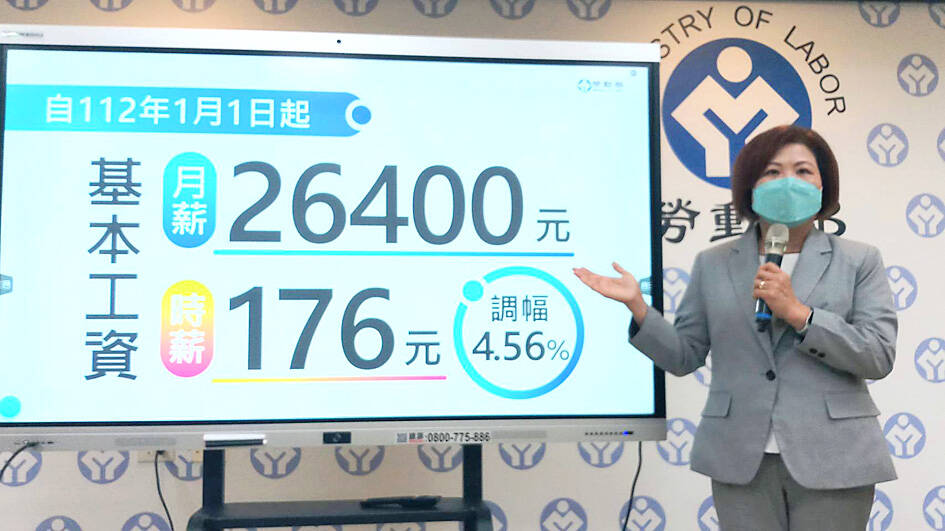The minimum wage next year is to increase to NT$26,400 (US$865) per month and NT$176 per hour, benefiting about 2.33 million Taiwanese, the Ministry of Labor said yesterday.
The statement came after the ministry convened a Basic Wage Commission meeting to finalize the plan to raise the current monthly minimum wage of NT$25,250 by 4.56 percent.
The plan is to be sent to the Executive Yuan for approval.

Photo: Lee Ching-hui, Taipei Times
Ministry data showed that 1.75 million workers would benefit from the monthly salary increase, including 1.27 million employees in the public sector and 484,300 migrant workers.
The increase in the minimum wage and the rate of labor insurance premiums would increase labor insurance premiums covered by employers, employees and the government.
The monthly wage increase would increase costs for employees, employers and the government by NT$1.041 billion, NT$19.124 billion and NT$1.117 billion respectively, the ministry said.
About 574,600 employees would benefit from the increase in the hourly minimum wage, which would increase the insurance costs for employees, employers and the government by NT$362 million, NT$6.309 billion and NT$431 million respectively, the ministry said.
In total, raising the minimum wage would increase cost for employees, employers and the government by NT$1.403 billion, NT$25.433 billion and NT$1.548 billion respectively, the ministry said.
The rate of labor insurance premiums next year would be raised to 12 percent, including 1 percent for employment insurance.
Employers, employees and the government would pay 70 percent, 20 percent and 10 percent of labor insurance premiums respectively.
If a worker earns a monthly wage of NT$26,400, the cost of the employment insurance borne by the employer, the employee and the government would increase by NT$185, NT$53 and NT$26 respectively.
General Chamber of Commerce of the ROC (全國商業總會) chairman Paul Hsu (許舒博) yesterday urged local firms not to raise prices after the minimum wage increase, saying that such a move would add inflationary pressure.
Hsu told a media briefing in Taipei that the government should implement measures to help small and medium-sized companies deal with rising costs so they would not have to place employees on unpaid leave.
Even though the minimum wage increase was higher than the 3 percent raise expected by local trade associations, the groups would still accept it, Hsu said.
Additional reporting by Kao Shih-ching

The US government has signed defense cooperation agreements with Japan and the Philippines to boost the deterrence capabilities of countries in the first island chain, a report by the National Security Bureau (NSB) showed. The main countries on the first island chain include the two nations and Taiwan. The bureau is to present the report at a meeting of the legislature’s Foreign Affairs and National Defense Committee tomorrow. The US military has deployed Typhon missile systems to Japan’s Yamaguchi Prefecture and Zambales province in the Philippines during their joint military exercises. It has also installed NMESIS anti-ship systems in Japan’s Okinawa

‘WIN-WIN’: The Philippines, and central and eastern European countries are important potential drone cooperation partners, Minister of Foreign Affairs Lin Chia-lung said Minister of Foreign Affairs Lin Chia-lung (林佳龍) in an interview published yesterday confirmed that there are joint ventures between Taiwan and Poland in the drone industry. Lin made the remark in an exclusive interview with the Chinese-language Liberty Times (the Taipei Times’ sister paper). The government-backed Taiwan Excellence Drone International Business Opportunities Alliance and the Polish Chamber of Unmanned Systems on Wednesday last week signed a memorandum of understanding in Poland to develop a “non-China” supply chain for drones and work together on key technologies. Asked if Taiwan prioritized Poland among central and eastern European countries in drone collaboration, Lin

TRAGEDY STRIKES TAIPEI: The suspect died after falling off a building after he threw smoke grenades into Taipei Main Station and went on a killing spree in Zhongshan A 27-year-old suspect allegedly threw smoke grenades in Taipei Main Station and then proceeded to Zhongshan MRT Station in a random killing spree that resulted in the death of the suspect and two other civilians, and seven injured, including one in critical condition, as of press time last night. The suspect, identified as a man surnamed Chang Wen (張文), allegedly began the attack at Taipei Main Station, the Taipei Fire Department said, adding that it received a report at 5:24pm that smoke grenades had been thrown in the station. One man in his 50s was rushed to hospital after a cardiac arrest

ON ALERT: Taiwan’s partners would issue warnings if China attempted to use Interpol to target Taiwanese, and the global body has mechanisms to prevent it, an official said China has stationed two to four people specializing in Taiwan affairs at its embassies in several democratic countries to monitor and harass Taiwanese, actions that the host nations would not tolerate, National Security Bureau (NSB) Director-General Tsai Ming-yen (蔡明彥) said yesterday. Tsai made the comments at a meeting of the legislature’s Foreign Affairs and National Defense Committee, which asked him and Minister of National Defense Wellington Koo (顧立雄) to report on potential conflicts in the Taiwan Strait and military preparedness. Democratic Progressive Party (DPP) Legislator Michelle Lin (林楚茵) expressed concern that Beijing has posted personnel from China’s Taiwan Affairs Office to its